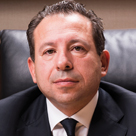
Osama Bishai
CEO of Orascom Construction
Real Estate & Construction / Egypt
“Egypt has a golden opportunity to specialize in construction services”
Orascom Construction (OC) is an engineering and construction contractor primarily focused on infrastructure, industrial and commercial projects with operations in over 20 countries. In 2015, the vast majority (71 per cent; see chart) of OC’s backlog of work went into infrastructure, making the company an important supporter of President Al Sisi’s ambitions to build the country to accommodate a rapidly growing population, which is expected to grow 64 per cent by 2050, reaching 151 million. OC’s top executive, Osama Bishai, explains more about the company’s role in Egyptian infrastructure.
What is your outlook for Egypt’s economic development?
While being bullish, we are extremely prudent. Today most of the largest regional infrastructure projects are here, which means Egypt has a golden opportunity to specialize in construction services for the entire Arab world. However, small contractors need to ensure that when this boom disappears, they can internationalize.
In what areas are you most optimistic?
There are three areas of development that make me optimistic for the future of Egypt: power generation, the transportation sector and public-private partnership (PPP) projects, which we pioneered in Egypt in 2010 and are positioned to continue leading today. Egypt already has a key ingredient needed to develop infrastructure: a huge workforce. Furthermore, the government has been steadily expanding budgetary expenditure on construction (see graph), with President Al Sisi increasing this year’s budget by 11.5 billion Egyptian pounds. Part of this massive growth in expenditure could be used to fuel future PPPs, as well as develop the capacity and institutionalization to monitor, develop and issue them.
How are you a pessimist?
Egypt should have more PPPs to develop lagging infrastructure. Under the current financial situation, PPPs are an ideal solution to enable investors to develop infrastructure while offloading burdens from the government, yet they are not being thoroughly utilized. The availability of foreign currency is also a continuing concern, as well as the related inadequacy of securing funding. Since it is a government obligation to be forthcoming about insufficient funds for infrastructure development, more transparent cooperation with banks to allocate capital is needed.
Why is construction so critical for Egypt?
The Egyptian population has been growing at high speed and infrastructure development needs to keep up with this demographic trend. In order to address demand, the government should prioritize developmental projects that focus on establishing a better quality of life. For example, water and wastewater systems are a large concern today because they are an infrastructural prerequisite for expansion of habitable land in the eastern and western parts of Egypt. Once we have the necessary infrastructure, we’ll be able to compete with the GCC nations and Turkey.
What’s needed to improve the flow of capital into construction?
Emirati investors, in particular, would like to come in, plug and play, and the government could enable this by creating a first-class PPP platform. The GCC, in general, can also do more to make investment relationships mutually beneficial and conducive: If GCC nations began to export credit through guarantees at domestic banks, this would enable Egyptian firms to borrow at reasonable costs, stimulating local investment to infrastructure. It is time to adopt a more sophisticated solution like this that has a direct impact on creating jobs and developing the country.
How has Orascom assisted in building the nation?
By mid-2015, Orascom successfully installed 2,200 megawatts on the national grid, playing a major role in alleviating the power crunch. Now we currently have 9 gigawatts under construction – enough to power an industrialised city of over 1 million people. This large capacity is the result of up to 15 years of investment into developing Orascom’s power generation capacities, which played a part in the $4 billion in revenue we posted in 2015. Furthermore, Orascom was recently awarded contracts worth $308 million to work on the third phase of the Cairo metro system, which we have participated in expanding since 2007.
What can potential investors learn from Orascom?
Through our 60 years of operation in Egypt, Orascom has expanded to create five different entities, each valued at over $1 billion. The wealth that we generated from Egypt sets a precedent for what can be achieved here: In spite of numerous political and economic challenges, Egypt is still profitable.
